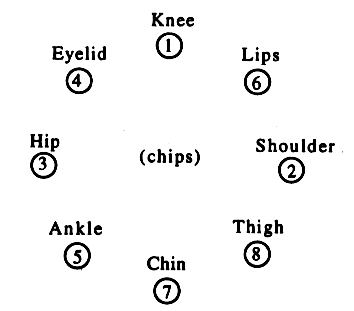QUICK GUIDE
- Key Words: Vocabulary, TPR, Games
- Learner English Level: All
- Learner Maturity Level: All
- Preparation Time: 5 minutes
- Activity Time: 15-30 minutes
My long hours of watching late-night TV have finally paid off. The following TPR activity was adapted from a drinking game that appeared on a variety show hosted by Downtown comedian, Hama-chan. The original version was called "Naha, Naha," and anyone who made a mistake in the game had to drink a shot of sake. I adapted the game to focus on a vocabulary topic that my conversation classes were working on却arts of the body. For better or worse, I eliminated the sake drinking aspect, substituting the paying of a poker chip as a penalty instead.
Materials Needed:
Poker chips or comparable objects (marbles, cards, etc.)
How to Play:
1. Arrange everyone in a circle facing inward. Sitting or standing makes no difference. Any number of students over five will work, but the more the merrier.
2. Pass out an equal number of chips to each person.
3. Before the game begins, everyone must choose a part of the body and be able to say it and point to it. Each person must have a different word. To be sure everyone understands this, go around the circle, with each person saying their word while pointing to the correct part of the body. Repeat as necessary until everyone can do this quickly and without pausing. Students should also make mental notes of which students have chosen which body parts. (Note: No one should choose the word "elbow.")
4. One person is chosen arbitrarily to start the game. He or she says another person's word and points to it on his or her own body. The person who is designated as that body part must immediately say another body part and point to it. (The second person should not choose the body part of the first person, however.)
5. Now here's the fun part: The person called on by the second person (that is, the third person) says nothing, but the people to his/her left and right must immediately say "elbow, elbow" while twice making the gesture of raising their hands to their head, which has the effect of pointing their elbows toward the center of the circle. This means everyone has to pay attention and react quickly if the person to his/her left or right is called on by the second person.
6. If all this happens without a hitch, the third person called on restarts as in step 4 above, and play continues without pause. This is unlikely to happen, however, as someone will make a mistake. People called on will fail to recognize they have been named, or people on either side of the second named person will fail to gesture and say "elbow, elbow," or people will gesture or call out of turn. Anyone making a rnistake of any kind must immediately toss a chip into the center of the circle.
7. The person with the most chips left at the end of the activity is the winner.
As participants gradually get used to the game, they are penalized for simply failing to react quickly enough. If participants are really quick-witted and are able to perform with few mistakes, have them change places in the circle occasionally.
Despite the apparent complexity of these instructions, my students readily grasped the idea, and play proceeded hysterically for about 20 or 25 minutes. Other teachers at my school have adapted the game to expand various vocabulary topics they were working on, all with positive results. In each adaptation, the name of the game is changed to reflect the new topic, but the gesture of raising hands to the head twice is always retained.
Example of a Correct Progression:
Student 1 (Knee): "Shoulder" (while pointing to own shoulder)
Student 2 (Shoulder): "Hip" (while pointing to own hip)
Student 4 (Eyelid) & 5 (Ankle): "Elbow, elbow" (while raising their hands to their heads)
Student 3 (Hip): "Lips" (while pointing to own lips)
Student 6 (Lips): "Eyeiid" (while pointing to own eye-lid)
Student 1 (Knee) and 3 (Hip): "Elbow, elbow" (while raising their hands to their heads)
Student 4 (Eyelid): "Chin" (while pointing to own chin), etc., etc.



